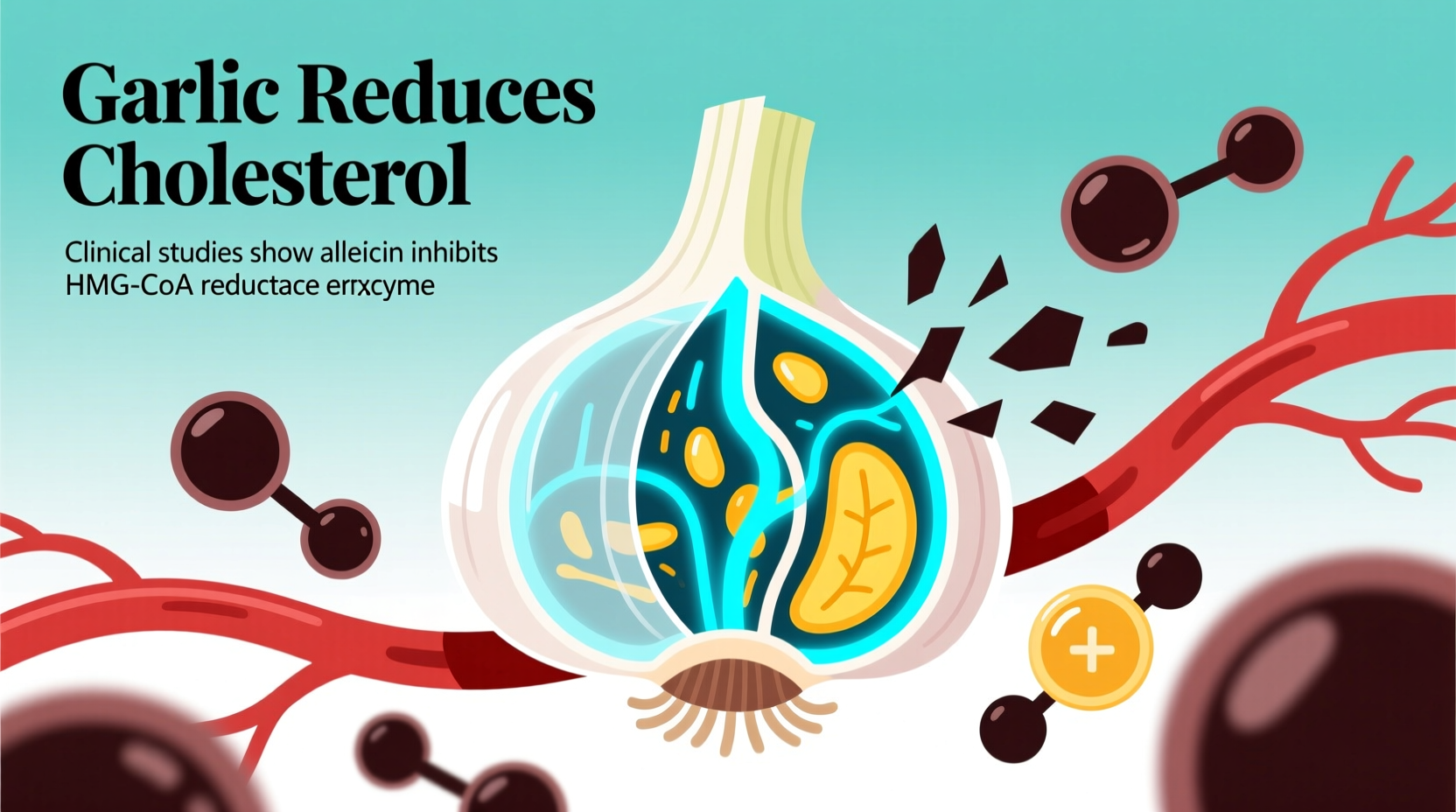Scientific evidence shows garlic may modestly reduce total cholesterol by 5-10% when consumed consistently at 0.5-1g daily of aged garlic extract or 2-4 fresh cloves, but it's not a replacement for prescribed cholesterol medications for those with significant cardiovascular risk.
Understanding Garlic's Role in Cholesterol Management
When you're searching for natural ways to support heart health, garlic often appears as a promising option. But what does the actual research say about garlic to lower cholesterol? Let's examine the evidence without the hype.
How Garlic Might Affect Cholesterol Levels
Garlic contains allicin and other sulfur compounds that appear to influence cholesterol metabolism through several mechanisms:
- Inhibiting cholesterol synthesis in the liver
- Reducing oxidation of LDL ("bad") cholesterol particles
- Modestly improving blood vessel function
- Exhibiting anti-inflammatory properties that support cardiovascular health
These biological effects form the theoretical basis for garlic's potential cholesterol-lowering properties, but real-world effectiveness varies significantly based on preparation method and dosage.
What the Research Actually Shows
Multiple clinical studies and meta-analyses have examined garlic's impact on cholesterol. The most comprehensive evidence comes from systematic reviews published in reputable medical journals.
| Study Type | Cholesterol Reduction | Duration | Garlic Form Used |
|---|---|---|---|
| Meta-analysis (2020) | 7-9% reduction in total cholesterol | 2-6 months | Aged garlic extract |
| Clinical trial (NIH-funded) | 5-6% reduction in LDL | 6 months | Raw garlic consumption |
| Systematic review (2022) | Modest HDL increase (3-5%) | 3-12 months | Various garlic preparations |
According to a comprehensive 2020 meta-analysis published in the Journal of Nutrition, aged garlic extract demonstrated the most consistent results, with average reductions of 7-9% in total cholesterol and 8-10% in LDL cholesterol after 2-6 months of consistent use. These effects are considered modest compared to prescription medications like statins, which typically reduce LDL by 30-50%.
Practical Guidance for Using Garlic
If you're considering adding garlic to support your cholesterol levels, here's what actually works based on clinical evidence:
Dosage Matters: Getting the Amount Right
Research shows effectiveness depends on consistent, adequate dosing:
- Fresh garlic: 2-4 cloves daily (approximately 6,000-12,000 mcg of allicin potential)
- Aged garlic extract: 600-1,200 mg daily in divided doses
- Garlic powder: 600-900 mg daily (standardized to 1.3% alliin)
Crucially, the preparation method affects potency. Crushing or chopping fresh garlic and letting it sit for 10 minutes before cooking maximizes allicin formation. Cooking methods also matter—gentle sautéing preserves more beneficial compounds than high-heat frying.
Realistic Timeframe Expectations
Unlike medications that work within weeks, garlic's cholesterol effects develop gradually:
- First 4-8 weeks: Minimal measurable changes
- 2-3 months: Initial modest reductions may appear
- 4-6 months: Maximum potential benefit typically observed
This American Heart Association research statement confirms that natural approaches like garlic require consistent, long-term use to potentially impact cholesterol levels.
Important Limitations to Understand
While garlic shows promise as a complementary approach, several critical limitations affect its practical use for cholesterol management:
Context Boundaries: When Garlic Isn't Enough
Garlic supplementation alone is inappropriate in these scenarios:
- LDL cholesterol above 190 mg/dL
- Existing cardiovascular disease
- Diabetes with additional risk factors
- Genetic cholesterol disorders like familial hypercholesterolemia
The Centers for Disease Control and Prevention clearly states that individuals with established heart disease or very high cholesterol require medication therapy, with lifestyle approaches serving as complementary measures.
Medication Interactions to Consider
Garlic can interact with several common medications:
- Increases bleeding risk when taken with blood thinners like warfarin
- May reduce effectiveness of HIV protease inhibitors
- Potentially enhances effects of certain blood pressure medications
Always consult your healthcare provider before adding garlic supplements if you're taking prescription medications.
Garlic vs. Prescription Options: Setting Realistic Expectations
Understanding the relative effectiveness helps set appropriate expectations:
- Statins: Reduce LDL by 30-50% on average
- Garlic supplements: Reduce LDL by 5-10% on average
- Dietary changes: Can reduce LDL by 10-15% with comprehensive approach
For those with moderately elevated cholesterol and low cardiovascular risk, a combination of dietary changes, regular exercise, and garlic supplementation might be appropriate. However, for those with significant risk factors, prescription medication remains the standard of care with proven mortality benefits.
Implementing Garlic Effectively in Your Routine
For those seeking to incorporate garlic as part of a heart-healthy approach, these evidence-based strategies maximize potential benefits:
Optimal Consumption Methods
- Use fresh garlic whenever possible—crush and let sit 10 minutes before cooking
- Aim for consistent daily intake rather than sporadic large doses
- Combine with other heart-healthy foods like olive oil, leafy greens, and fatty fish
- Consider aged garlic extract supplements if you dislike garlic's taste or odor
Tracking Your Progress
If using garlic to support cholesterol management:
- Get baseline cholesterol testing before starting
- Repeat testing after 3-4 months of consistent use
- Track other heart health markers like blood pressure
- Maintain a food and supplement journal to monitor patterns

Final Considerations for Heart Health
While garlic for lowering cholesterol shows modest promise, it works best as part of a comprehensive approach that includes:
- Regular physical activity (150+ minutes weekly)
- Heart-healthy dietary patterns like Mediterranean diet
- Maintaining healthy body weight
- Smoking cessation if applicable
- Stress management techniques
Remember that no single food or supplement can overcome multiple unhealthy lifestyle factors. For those with significantly elevated cholesterol or existing heart disease, evidence-based medical treatment remains essential.











 浙公网安备
33010002000092号
浙公网安备
33010002000092号 浙B2-20120091-4
浙B2-20120091-4